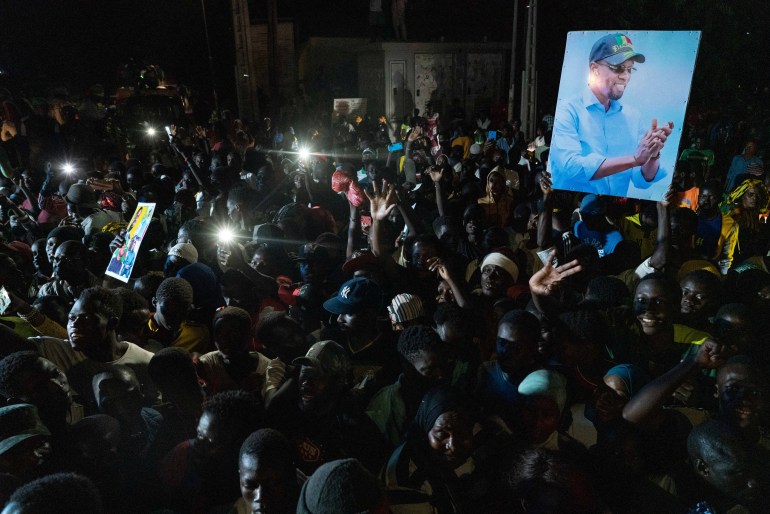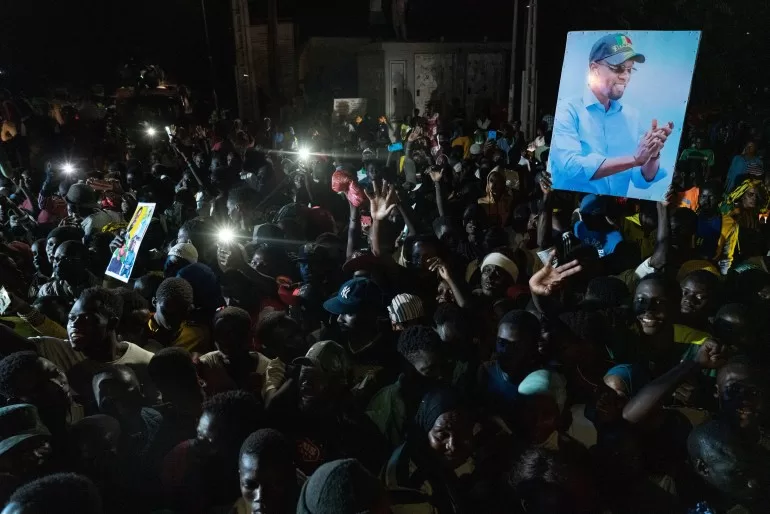Nineteen candidates are running in Sunday’s election, including former Prime Minister Amadou Ba, 62, for the ruling Benno Bokk Yaakaar coalition, and Bassirou Diomaye Faye, 43, a tax inspector running in place of jailed opposition figure Ousmane Sonko.
While most candidates favour maintaining the economic status quo, Faye and Sonko have suggested the creation of a new currency as well as the renegotiation of mining and energy contracts.
Senegal has been widely seen as a safe investment destination in West Africa. And thanks to its track record of peaceful transitions of power since independence in the 1960s, it is generally considered one of the most stable democracies in the coup-prone region, where, since 2020, military power grabs have taken place in Mali, Burkina Faso and Niger.
But challenges in Senegal’s political sphere in recent months have led to uncertainty about its democratic future.
In January, outgoing President Macky Sall delayed the election previously set for February by 10 months. Critics maintained that Sall’s decision was an attempt to cling to power by bypassing the constitution’s two-term limit. The move sparked deadly protests and concerns about democratic backsliding. Sall then backtracked following a constitutional court order, and set this coming Sunday as election day.
Now the focus is on whether the vote will run smoothly so voters will trust, and accept, its outcome.
“In the medium to long term, there is a real concern among investors about what this election saga means for democracy and, therefore, stability,” said Tiffany Wognaih, senior associate with Africa Matters Limited, a risk analysis consulting firm.
“Their focus is less on the result, more on the process,” she told Al Jazeera.
‘Wait and see’
Along with Ivory Coast, Senegal is considered one of the economic powerhouses of Francophone West Africa with an average 5 percent growth annually for more than a decade.
Foreign direct investment in the country grew to nearly $2.6bn in 2021 – an eightfold increase compared with 10 years earlier, according to data from the United Nations trade agency.
The economic boom stalled during the COVID-19 pandemic, and since then, it has struggled with other shocks, including spillovers from the war in Ukraine and India’s restrictions on rice exports.
Yet its relative stability paved the way for a $1.9bn International Monetary Fund (IMF) loan last year, and its emerging oil and gas industry is projected to make the country one of the strongest growing economies in sub-Saharan Africa, according to the IMF.
The financial institution forecasts that upcoming natural gas projects will boost gross domestic product growth to double digits by 2025.
France is Senegal’s largest investor, but more recently, countries including China, Turkey and the United Arab Emirates have also put in money. In early 2023, Dubai pledged $1.1bn for a port construction.
Sectors attracting investments range from oil and gas to logistics, agribusiness and mining.
However, Africa Matters Limited’s Wognaih said that due to uncertainty surrounding the election, investors face higher operational and security risks. And while most have not shut down their operations, they remain in a “wait and see” mode over regulatory and legislative changes that could happen with a new government.

Softening the tone
While most of the 19 candidates have proposed programmes that seem to guarantee relative continuity with the previous government’s policies, one stands out.
Faye is a popular figure among young voters and considered a strong candidate for president.
He has stepped in for firebrand politician Sonko, who was seen as Sall’s strongest contender before Sonko was barred from running in the election over a defamation case against him. Sonko’s supporters maintain that the case was a plot to get him out of the way.
In his political manifesto, Faye presented some profound changes, including monetary reforms to abandon the CFA franc, used by primarily former French colonies in Africa, and introduce its own currency. Senegal is a member of the West African Economic and Monetary Union, where the CFA franc is tied to the euro and governed by a central bank.
Faye also pledged to review mining and energy contracts for a more equitable distribution of resources and grant more space to local actors, such as giving state oil company Petrosen offshore blocks that have not yet been awarded.
Analysts say they expect his rhetoric to tone down should he take the country’s top job.
Signs of that shift have already emerged. Last week, Sonko backed off on the promise to create a national currency. He said the opposition would first try to implement currency reforms at the subregional level and, if that fails, “we will make a decision as a nation”.
“Faye and Sonko benefit from the support of a number of civil society actors and entrepreneurs, and they are aware of the need to be progressive but also cautious,” said Gilles Yabi, founder and president of WATHI, a citizen think tank in West Africa.
Furthermore, Faye is massively popular among Senegalese youth, promising to fix youth unemployment – one of the top headaches of successive governments. Three out of 10 Senegalese aged 18 to 35 are jobless, according to Afrobarometer data, despite the country’s economic growth.
Reviewing mining and energy contracts could see foreign mining companies paying more taxes in line with a growing trend among African countries to gain additional revenue from national resources. But it could also mean stops or delays in energy projects, which could in turn hamper economic activity.
“If they win, it will be hard to change everything. They will be under pressure to deliver what they have been promising to the youth in terms of economic growth,” Yabi told Al Jazeera.
